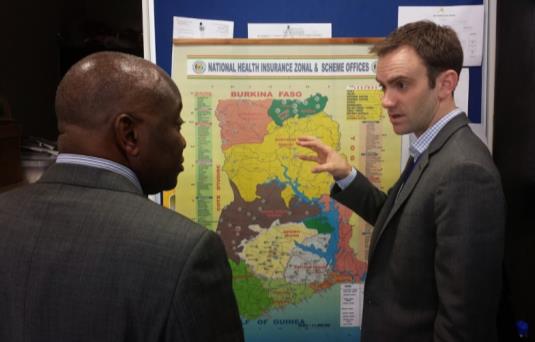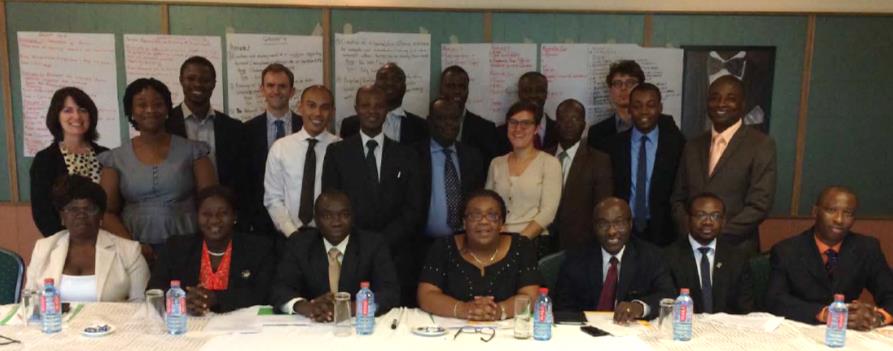Since its establishment in September 2003, Ghana’s National Health Insurance Scheme (NHIS) has captured the attention of the global health community as one of the most ambitious plans for universal health coverage in Africa. Currently covering an estimated 35% of the population, the NHIS offers a wealth of lessons around ways to raise revenue for health, organize purchasing from public and private providers, and provide financial risk protection.

HFG’s Nathan Blanchet reviews the NHIS coverage map with Director of Management Information Systems Perry Nelson.
Photo: Andrew Won.
USAID recognizes that ensuring the long term sustainability and success of the NHIS is a critical component of achieving the objectives of the country’s Health Financing Strategy and will require broad, forward-thinking discussions and strategy development. Key priority areas include increasing coverage, refining provider payment systems, improving quality of service delivery, strengthening support systems and management, and using evidence to continuously improve NHIS implementation.
USAID’s HFG project has partnered with the National Health Insurance Agency (NHIA) in Ghana to support the financial sustainability of the NHIS while also increasing enrollment and improving effective coverage of quality health services. HFG’s approach consists of three main activities:
- Develop a sustainability road map for the NHIS, including a long-term vision, strategy and plans to increase efficiency and sustainability and contain costs by balancing revenue generation and expenditure management;
- Review a pilot capitated provider payment system in primary healthcare clinics in order to align provider payment mechanisms with the variable costs of patient care, with the aim to scale-up revised capitation approach in 1-3 additional regions;
- Support the NHIA as an evidence-based health purchaser by enhancing the NHIA’s claims data collection and analytic processes, strengthening monitoring and evaluation across NHIS operations, and by identifying and improving NHIA’s internal performance management practices that directly affect the generation and use of evidence for health purchasing.

Approximately 20 NHIA directors and managers serve on a steering committee for the development of a monitoring and evaluation dashboard for the NHIA. “The work is not done – it is a first step. As a committee, we have a lot more work to do,” noted Dr. Lydia Dsane-Selby, the NHIA’s Director of Claims, after a workshop on dashboard development facilitated by HFG in May 2014. Photo: HFG.
Announcements and successes
- Defining Institutional Arrangements when Linking Financing to Quality in Healthcare in Ghana Stakeholder Engagement Workshop
- Peer-to-Peer Workshop in Accra Brings Together Stakeholders from across the African Continent
- Tackling the Challenge of Financial Sustainability: Ghana’s National Health Insurance Authority (video)
- Ghana’s Learning Exchange with Taiwan Builds Confidence, Cooperation in National Health Insurance Agency
- Ghana Health Insurance Officials Hone Monitoring and Evaluation Skills
- Ghana Case Study Highlights Lessons for Universal Health Coverage
- Ghana Reviews Insurance Benefits Package
Publications
- Ghana’s National Health Insurance Scheme: Ensuring Access to Malaria Services with Financial Protection
- Essential Package of Health Services Country Snapshot: Ghana
- Building on Community-based Health Insurance to Expand National Coverage: The Case of Ghana
- Maternal Health in Ghana: Investigating the Impact of the National Health Insurance Scheme on Maternal Health Indicators



